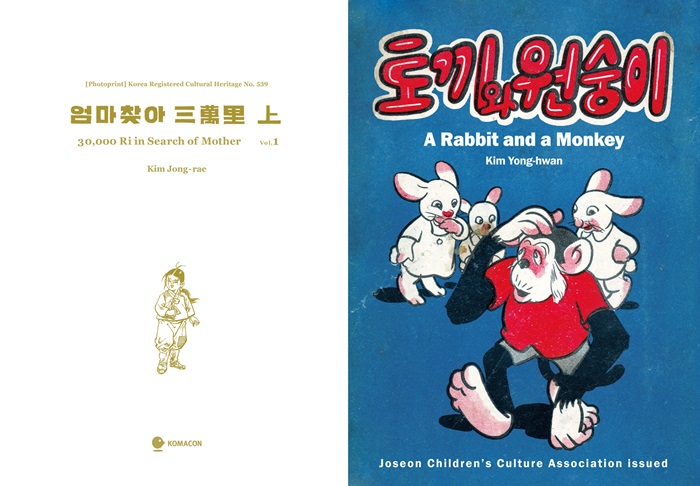
English translations of ’30,000-ri in Search of Mother’ and ‘A Rabbit and a Monkey’ have now been distributed at comic museums overseas, Korean cultural centers around the world, Korean studies institutes and at Korea Tourism Organization offices. All locations are open to the public.
English copies of "30,000-ri in Search of Mother" and "A Rabbit and a Monkey" have been distributed to 103 institutes around the world, such as comic museums, Korean cultural centers, Korean studies institutes and offices of the Korea Tourism Organization.
The two comic books have been recognized for their value as modern cultural heritage items and were named as official Registered Cultural Heritage Items in February 2013. They were the first comics to become official Korean cultural heritage items.
"30,000-ri in Search of Mother," published in 1958, is the first best-selling comic book in Korea. It's about the journey of a boy named Geumjun in search of his mother, who was sold into slavery during Joseon times. Although it was staged in Joseon Korea, its episodes mirror Korean society during the 1950s.
"A Rabbit and a Monkey," published in 1946, is the oldest Korean comic book. The animal characters depict the political situation in Korea upon independence. It also touches upon the unjust invasion and colonization committed by the Japanese colonial rulers. The comic book is a valuable source that hints at life immediately following colonial rule in the 1940s.
English versions of the two comic books have been distributed to 12 overseas comic museums, including ones in France and Belgium, to 41 Korean cultural centers, to 20 Korean studies institutes and to 30 branches of the Korea Tourism Organization. All locations are open to the public.
Oh Jae-rok, president of the Korea Manhwa Contents Agency, said, “The overseas distribution of English versions will allow more people to read Korea’s comic book cultural heritage items in person.”
By Kim Young Shin
Korea.net Staff Writer
Photo: Korea Manhwa Contents Agency
ysk1111@korea.kr